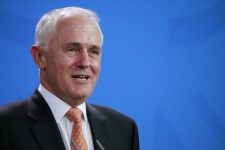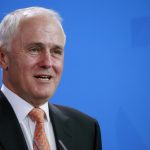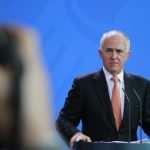Turnbull’s War on Welfare Recipients

As you sit at home in your Point Piper mansion, and it’s getting close to end of year celebrations, what else would one think as prime minister of Australia, but, “Who am I gonna take a swipe at next? Ah, welfare recipients.”
And that was the direction Malcolm Turnbull and his Coalition cronies took things over the period between Christmas and New Year’s. Headlines blazed with the revelation that hard-working Aussies are forking out $83 a week to cover the welfare bill.
The federal treasury released official data on December 28 that revealed the average Australian taxpayer is handing over $6.30 a week to the unemployed, is contributing $20 a week to family payments, $17 a week is for people with disabilities, and $35 a week goes towards aged pensioners.
After outlining these figures, a report in the Daily Telegraph explained that the treasury expects government borrowing to rise to $684 million over the next decade. While the nation’s debt has “blown out” since the statutory “debt ceiling,” which had curbed borrowing, was abolished in 2013.
Liberal senator Eric Abetz warned that the children of today would have to pay off this debt, unless the government slashed its spending. And the obvious implication being that aged pensioners and people with disabilities are to blame for all of this, and their money should be cut off.
Welfare reforms to pass
The Turnbull government’s Social Services Legislation Amendment (Welfare Reform) Bill 2017 has been stuck in the senate since last September. But, after a number of amendments, it looks set to pass when parliament resumes next month.
The welfare reforms don’t have the backing of Labor or the Greens. So, the Coalition is relying on the support of the Nick Xenophon Team and One Nation. And NXT have agreed to support the bill in exchange for $40 million dollars in funding for rehabilitation services.
As part of the deal, the government has agreed to drop its controversial welfare drug testing plan. In early December, then social services minister Christian Porter said the government was willing to the forgo the proposal in order to get the bulk of the welfare bill through parliament.
The welfare reforms
However, those in the social sector warn that this piece of legislation is still set to make life harder for some of the community’s most vulnerable people. The bill will introduce a “targeted compliance framework,” which “strengthens penalties for non-compliance.”
This framework will establish demerit point system, where welfare recipients can be lose their payments for up to a month, in much the same way that dangerous driving can lead a person to lose their licence. Penalties will apply for failing to look for jobs, and missing appointments and training.
The legislation will also consolidate seven working age payments into one, establishing the new Jobseeker Payment. From March 20 2020, Newstart Allowance, Sickness Allowance, Wife Pension, Bereavement Allowance and Widow B Pension will all be abolished.
The Bereavement Allowance is a safety net for low-income individuals who lose their partners. The abolition of this allowance will hit pregnant women the hardest, as they will lose up to $5,000 as a result of the reform, and still be expected to deal with their newborn baby on their own.
The intent to claim provision will also be removed. This allows people to receive backdated payments from their initial date of contact, prior to submitting their claim. This has implications for individuals who can’t lodge their paperwork as they’re hospitalised or fleeing domestic violence.
And welfare recipients over the age of 60 will also be required to volunteer for at least 10 hours of work a fortnight in order to be eligible for payments.
Gone, but not forgotten
But, just after the government agreed to drop welfare drug testing, the prime minister told the Courier-Mail that fresh legislation would be drafted next year in order to get the heavily criticised proposal back on track.
Welfare drug testing was slated to commence on January 1. It was to involve the testing 5,000 recipients for cannabis, MDMA and amphetamine use.
If an individual failed a test, they’d have their payments quarantined, meaning restrictions would be placed on how they could spend 80 percent of the money.
The government repeatedly stated that testing would be random. However, the three trial sites were going to be targeted areas known to be locations of high drug use, due to the national sewage water testing program.
And a “data-driven profiling tool” was going to be used to in order to identify individuals who were suitable for testing. This tool was to weed out recipients with “relevant characteristics that indicate a higher risk of substance abuse issues.”
Turnbull also indicated that the government would resurrect a proposal to stop people with substance use disorder from claiming the Disability Support Pension. An estimated 450 people a year with chronic drug and alcohol problems would have been affected by this move.
This reform, which was before parliament on a separate amendment bill, was voted down last June.
The real culprits
The Telegraph article bemoaning the plight of taxpayers, who foot the bill for welfare recipients, made clear that pensioners and recipients “pay very little tax.” However, while it was bashing the poor, the tabloid forgot to mention another sector of society that’s refusing to pay its share.
On the same day that the marriage equality bill passed through parliament, the Australian Tax Office released corporate tax data revealing the total income and tax payable of over 2,040 companies for the financial year 2015-16.
The data revealed that of these companies 732 paid absolutely no tax, while their collective income was $500 billion. And indeed, the owner of the Daily Telegraph was one such corporation, along with major airlines and oil companies.
Fair game
So, it seems that hard-working Australians are left to cover the nation’s poorest and most vulnerable people, while major companies get to reap the benefits of the system they operate within without having to contribute to the welfare of its most underprivileged citizens.
And instead of calling out the nation’s wealthiest for their lack of contribution, politicians prefer to attack aged petitioners and people with disabilities.
It seems that threatening to cut off payments to the needy, so they could join the ranks of the nation’s ever-growing homeless population, is fair holiday season sport.







